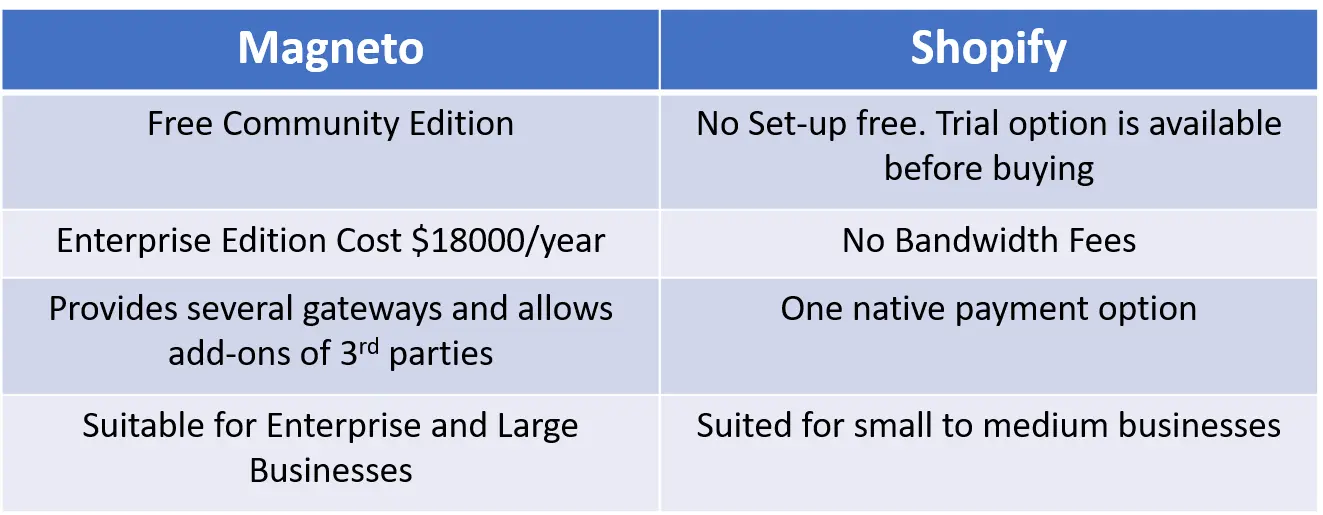
 eCommerce
eCommerceMagento vs. Shopify: Which Platform is Best for Your Ecommerce Business in 2025

Content
There are countless e-commerce platforms that provide essential tools and functionalities for creating, managing, and optimizing online stores. Among them, Magento (also known as Adobe Commerce) and Shopify stand out as leading choices, each offering distinct advantages tailored to diverse business needs.
Shopify is preferred by businesses new to the digital world due to its simplicity and ability to handle large volumes effortlessly. In contrast, Magento’s flexible platform capabilities offer coders ample space to customize sites and leverage powerful features.
Are you unsure whether to choose Magento or Shopify for your e-commerce website?
This blog explores Magento vs. Shopify and aims to help businesses navigate their options and make informed decisions regarding their specific e-commerce objectives.
What is an eCommerce Platform?
An eCommerce platform is a software solution that allows businesses to create and manage an online store to sell products or services. It provides the tools and infrastructure needed to handle tasks such as:
- Product Listings: Displaying and organizing items for sale.
- Shopping Cart and Checkout: Allowing customers to add products to a cart and complete their purchase.
- Payment Processing: Integrating with payment gateways to securely process transactions.
- Inventory Management: Tracking stock levels and managing availability.
- Order Fulfillment: Managing shipping, delivery, and returns.
- Customer Management: Keeping track of customer accounts, profiles, and interactions.
- Analytics and Reporting: Providing insights into sales, traffic, and customer behavior.
Magento vs Shopify 2025: A Detailed Comparison
Here is an overview of Magento vs Shopify:
1. Magento Vs Shopify: Popularity
Magento
Magento, launched in 2004, was the most famous eCommerce medium. Magento's popularity lies in its personalization capabilities, which still attract a loyal customer base. It powers around 12 percent of all internet shops, and 1.2 percent of businesses use it.
Shopify
In the last few years, Shopify swiftly occupied 21% of eCommerce shops. Since it's easy to use, it has garnered attention from many businesses.
Magento vs Shopify vs Woocommerce
Here is a comparison between Magento, Shopify, and WooCommerce:
2. Shopify Vs Magento: Code Usability
Shopify
Shopify protects its code and doesn't allow any modifications. With Shopify, customization and new add-ons are not possible. While this move reduces flexibility, businesses still appreciate Shopify because it works well for simple web stores.

Magento
Magento empowers the programmers to build on their code as they see fit for the consumer.
We’ve highlighted some other code differences for you.
Magento vs Shopify Comparison Chart: Design
3. Magento Vs Shopify: Ease of Use
Naturally, most novice firms want to build sites quicker and start selling as fast as they can. They need their team to quickly get accustomed to the site, understand its features, and take advantage of those features easily.
Magento
Magento is a quick-to-deploy tool that needs technical expertise to build. Sustaining such sites also requires extended developer support to fix issues and ensure smooth running. While it may not suit new stores, experienced e-commerce stores find its flexibility and custom interface extremely liberating. Unlike Shopify, Magento needs a lot of design restyling that takes up significant set-up time.
Shopify
Shopify is the ideal choice for novice businesses to set up businesses and run them well quickly. Simply browsing for 10 minutes can aid quick learning! With its revolutionary drag-and-drop tools, website building becomes extremely simple and fast. To use even more attractive features, firms can look up to their store to add multiple apps.

4. Shopify Vs Magento: Hosting
Shopify
Through Shopify, you host your website through cloud-based systems. So you don't need to search for a different hosting service. The platform effectively handles your server operations, site performance, and security updates. In exchange for this freedom, you lose site control and the ability to manage your data according to your needs. For retail businesses with highly sensitive information, it's risky to try this medium. Such platforms need a high level of personalization that cloud services cannot provide.

Magento
You can opt for on-site hosting, on-the-cloud hosting, or third-party hosting through Magento. If you choose cloud hosting, you allow Magento to host and run your site. However, the open-source option lets you purchase the domain and host the site. This flexibility gives you full server access and directory access to change the code according to your needs. For this additional facility, inevitably, you need to shell out more bucks for security and hosting.
5. Magento Vs Shopify: Costs
Shopify
The first step towards building a website on this platform is to select a good theme. You could choose one of the ten free themes or opt for classy paid themes for $140 to $150. The right theme will help you enhance customer experience, increase site visits, and improve SEO rankings. Eventually, this sum pays for itself when you garner sales.
Shopify gives a free domain name if you opt for their monthly package! However, it'll contain the brand in your URL, like www.yoursitename.myshopify.com. To avoid such an unprofessional domain name, we recommend buying it instead. You may have to shell out an additional $10 to $15 annually.
The platform also offers a 14-day trial period to test their plan before opting for a paid one. If you decide to use their paid services, you can choose a monthly plan, a 1-year plan, or a 2-year plan. By selecting longer-duration plans, savings can go up to 20 percent over two years.
These costs cover the following: -
- 24*7 site support
- Free SSL certificate that shows your site is secure
- Analysis that protects you against hackers
- Unlimited storage space for all site content
- Ample space to handle a high volume of users

Magento
Just like Shopify, theme and domain name charges also apply to the Magneto platform. However, hosting service charges also apply to the other costs since it's a self-hosted platform. If you choose a low-cost hosting service, you'll compromise on the bandwidth and site performance. Also, as you scale, you must ensure your hosting vendor scales with you. When you don't pay attention to these issues, your online presence becomes less appealing to your users, impacting your shop.
So, select a hosting plan that gives your site room to flourish and manage a greater visitor load. Based on your storage needs, hosting services cost $4 to $1000 per month. Please don't skimp on this part, as it can lead to site crashes that are bad for business! We recommend Bluehost or HostGator for hosting services.
If you're inexperienced in coding, you'll also need a great developer to create a compelling site. Ensure that you factor in development costs as well.
Magento vs Shopify Pricing
Adobe Magento Vs Shopify: Themes and Extension Costs
Magento vs. Shopify - Conclusion
Magento and Shopify are not only tools for building online e-commerce stores but also essential partners in driving digital transformation and business success. As e-commerce continues to evolve, these platforms also evolve and play a significant role in helping businesses navigate challenges, capitalize on opportunities, and deliver exceptional value to their customers.

Magento and Shopify are not only tools for building online e-commerce stores but also essential partners in driving digital transformation and business success. As e-commerce continues to evolve, these platforms also evolve and play a significant role in helping businesses navigate challenges, capitalize on opportunities, and deliver exceptional value to their customers.
At Invensis, we empower e-commerce businesses using Magento and Shopify with robust solutions that streamline operations, improve customer satisfaction, and drive revenue growth in competitive digital markets. Our expertise in these ecommerce platforms helps businesses utilize the full potential of these platforms while focusing on core objectives and strategic initiatives. Over the years, we have assisted numerous online retail businesses and simplified their processes with our ecommerce support services. Contact us to choose the best one that suits your specific business needs.
Frequently Asked Questions
Discover Our Full Range of Services
Click HereExplore the Industries We Serve
Click HereBlog Category
Related Articles

Find the leading accounting firms in Singapore trusted by businesses for audit, tax, and advisory services.
November 6, 2025
|

Explore the leading accounting firms in South Africa providing expert audit, tax, cloud accounting, and payroll services. Learn about their key features and unique offerings.
November 6, 2025
|

Explore what project accounting is, how it works, and why it’s essential for businesses. Understand key principles, revenue recognition methods, and best practices to improve your knowledge.
October 7, 2025
|
Services We Provide
Industries We Serve





.webp)